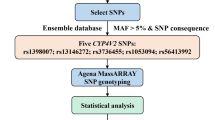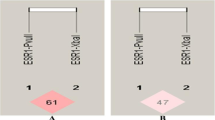Abstract
The prevention and treatment of coronary heart disease (CHD) is a difficult problem to be solved urgently. Genetic factors play a crucial role in CHD development. This study aimed to investigate the association of GAS5/METTL14/ESR1 polymorphisms with CHD susceptibility. We carried out a case–control study that included 506 patients and 506 healthy subjects to detect the correlation between GAS5/METTL14/ESR1 polymorphisms and CHD risk in a Chinese population. Odds ratios (OR) and 95% confidence intervals (CI) were computed to assess the associations. Our study showed that GAS5 rs17359906 (OR 2.32, p = 0.020) and rs75315904 (OR 0.41, p = 0.039) were related to the risk of CHD in females. ESR1 rs6927072 (OR 1.76, p = 0.007) and rs4870061 (OR 0.74, p = 0.036) correlated with CHD risk in age ≤ 60 years. GAS5 rs17359906 (OR 0.10, p = 0.032) and ESR1 rs3020308 (OR 2.73, p = 0.041) were associated with an increased susceptibility to CHD in smokers. We also found that METTL14 rs4834698 (OR 1.57, p = 0.044) and ESR1 rs4870061 (OR 0.62, p = 0.040) were associated with CHD susceptibility in non-drinkers. Besides, METTL14 rs17050450 (OR 0.48, p = 0.029) and ESR1 rs3853248 (OR 1.61, p = 0.018) had the susceptibility of CHD patients with diabetes. Our study indicated that GAS5/METTL14/ESR1 polymorphisms were associated with CHD risk, which might provide a new understanding of CHD in a Chinese population.
Similar content being viewed by others
Data availability
Participant informed consent statements did not seek consent for data to be made publicly available; however, data will be made available to individual researchers upon reasonable request.
Abbreviations
- AS:
-
Atherosclerosis
- CHD:
-
Coronary heart disease
- CI:
-
Confidence intervals
- OR:
-
Odds ratios
- MAF:
-
Minor allele frequency
- HWE:
-
Hardy–Weinberg equilibrium
- SNP:
-
Single nucleotide polymorphism
References
Almeida S, Hutz MH (2006) Estrogen receptor 1 gene polymorphisms and coronary artery disease in the Brazilian population. Braz J Med Biol Res 39(4):447–454. https://doi.org/10.1590/s0100-879x2006000400004
Chen CY, Chuang SY, Fang CC, Huang LC, Hsieh IC, Pan WH, Yeh HI, Wu CC, Yin WH, Chen JW (2014) Gender disparities in optimal lipid control among patients with coronary artery disease. J Atheroscler Thromb 21:S20–S28. https://doi.org/10.5551/jat.21_sup.1-s20
Chen J, Ning Y, Zhang H, Song N, Gu Y, Shi Y, Cai J, Ding X, Zhang X (2019) METTL14-dependent m6A regulates vascular calcification induced by indoxyl sulfate. Life Sci 239:117034. https://doi.org/10.1016/j.lfs.2019.117034
Choromańska B, Myśliwiec P, Choromańska K, Dadan J, Chabowski A (2017) The role of CD36 receptor in the pathogenesis of atherosclerosis. Adv Clin Exp Med 26(4):717–722. https://doi.org/10.17219/acem/62325
Dalen JE, Alpert JS, Goldberg RJ, Weinstein RS (2014) The epidemic of the 20(th) century: coronary heart disease. Am J Med 127(9):807–812. https://doi.org/10.1016/j.amjmed.2014.04.015
Deloukas P, Kanoni S, Willenborg C, Farrall M, Assimes TL, Thompson JR, Ingelsson E, Saleheen D, Erdmann J, Goldstein BA et al (2013) Large-scale association analysis identifies new risk loci for coronary artery disease. Nat Genet 45(1):25–33. https://doi.org/10.1038/ng.2480
GBD 2013 Mortality and Causes of Death Collaborators (2015) Global, regional, and national age-sex specific all-cause and cause-specific mortality for 240 causes of death, 1990–2013: a systematic analysis for the Global Burden of Disease Study 2013. Lancet (london, England) 385(9963):117–171. https://doi.org/10.1016/s0140-6736(14)61682-2
Han L, Ma P, Liu SM, Zhou X (2016) Circulating long noncoding RNA GAS5 as a potential biomarker in breast cancer for assessing the surgical effects. Tumour Biol 37(5):6847–6854. https://doi.org/10.1007/s13277-015-4568-7
Herrington DM, Howard TD, Hawkins GA, Reboussin DM, Xu J, Zheng SL, Brosnihan KB, Meyers DA, Bleecker ER (2002) Estrogen-receptor polymorphisms and effects of estrogen replacement on high-density lipoprotein cholesterol in women with coronary disease. N Engl J Med 346(13):967–974. https://doi.org/10.1056/NEJMoa012952
Hihi AK, Wahli W (1999) Structure and Function of the Estrogen Receptor. Springer Berlin Heidelberg, Berlin
Jian D, Wang Y, Jian L, Tang H, Rao L, Chen K, Jia Z, Zhang W, Liu Y, Chen X et al (2020) METTL14 aggravates endothelial inflammation and atherosclerosis by increasing FOXO1 N6-methyladeosine modifications. Theranostics 10(20):8939–8956. https://doi.org/10.7150/thno.45178
Karas RH, Patterson BL, Mendelsohn ME (1994) Human vascular smooth muscle cells contain functional estrogen receptor. Circulation 89(5):1943–1950
Ketab FNG, Gharesouran J, Ghafouri-Fard S, Dastar S, Mazraeh SA, Hosseinzadeh H, Moradi M, Javadlar M, Hiradfar A, Rezamand A et al (2020) Dual biomarkers long non-coding RNA GAS5 and its target, NR3C1, contribute to acute myeloid leukemia. Exp Mol Pathol 114:104399. https://doi.org/10.1016/j.yexmp.2020.104399
Kunnas TA, Laippala P, Penttilä A, Letimäki T, Karhunen PJ (2000) Association of polymorphism of human alpha oestrogen receptor gene with coronary artery disease in men: a necropsy study. BMJ Clin Res Ed 321(7256):273–274. https://doi.org/10.1136/bmj.321.7256.273
Lettre G, Palmer CD, Young T, Ejebe KG, Allayee H, Benjamin EJ, Bennett F, Bowden DW, Chakravarti A, Dreisbach A et al (2011) Genome-wide association study of coronary heart disease and its risk factors in 8,090 African Americans: the NHLBI CARe Project. PLoS Genet 7(2):e1001300. https://doi.org/10.1371/journal.pgen.1001300
Liu J, Eckert MA (2018) m(6) A mRNA methylation regulates AKT activity to promote the proliferation and tumorigenicity of endometrial cancer. Nat Cell Biol 20(9):1074–1083. https://doi.org/10.1038/s41556-018-0174-4
Liu J, Yue Y, Han D, Wang X, Fu Y, Zhang L, Jia G, Yu M, Lu Z, Deng X et al (2014) A METTL3-METTL14 complex mediates mammalian nuclear RNA N6-adenosine methylation. Nat Chem Biol 10(2):93–95. https://doi.org/10.1038/nchembio.1432
Liu CW, Sung HC, Lin SR, Wu CW, Lee CW, Lee IT, Yang YF, Yu IS, Lin SW, Chiang MH et al (2017) Resveratrol attenuates ICAM-1 expression and monocyte adhesiveness to TNF-alpha-treated endothelial cells: evidence for an anti-inflammatory cascade mediated by the miR-221/222/AMPK/p38/NF-kappaB pathway. Sci Rep 7:44689. https://doi.org/10.1038/srep44689
Lu H, Chen D, Hu LP, Zhou LL, Xu HY, Bai YH, Lin XY (2014) Estrogen receptor alpha gene polymorphisms and breast cancer risk: a case-control study with meta-analysis combined. Asian Pac J Cancer Prev 14(11):6743–6749. https://doi.org/10.7314/apjcp.2013.14.11.6743
Mahdi Eftekharian M, Noroozi R, Komaki A, Mazdeh M, Taheri M, Ghafouri-Fard S (2019) GAS5 genomic variants and risk of multiple sclerosis. Neurosci Lett 701:54–57. https://doi.org/10.1016/j.neulet.2019.02.028
Maity A, Das B (2016) N6-methyladenosine modification in mRNA: machinery, function and implications for health and diseases. FEBS J 283(9):1607–1630. https://doi.org/10.1111/febs.13614
Mo XB, Lei SF, Zhang YH, Zhang H (2018) Detection of m(6)A-associated SNPs as potential functional variants for coronary artery disease. Epigenomics 10(10):1279–1287. https://doi.org/10.2217/epi-2018-0007
Prensner JR, Chinnaiyan AM (2011) The emergence of lncRNAs in cancer biology. Cancer Discov 1(5):391–407. https://doi.org/10.1158/2159-8290.cd-11-0209
Schunkert H, König IR, Kathiresan S, Reilly MP, Assimes TL, Holm H, Preuss M, Stewart AF, Barbalic M, Gieger C et al (2011a) Large-scale association analysis identifies 13 new susceptibility loci for coronary artery disease. Nat Genet 43(4):333–338. https://doi.org/10.1038/ng.784
Sun Y, Jia X, Wang M, Deng Y (2019) Long noncoding RNA MIR31HG abrogates the availability of tumor suppressor microRNA-361 for the growth of osteosarcoma. Cancer Manag Res 11:8055–8064. https://doi.org/10.2147/cmar.s214569
Sun Y, Yan J, Zhang J, Wang A, Zou J, Gao C (2020) Contribution of IL-7/7R genetic polymorphisms in coronary heart disease in Chinese Han population. Int Immunopharmacol 79:106084. https://doi.org/10.1016/j.intimp.2019.106084
Tao H, Zhang JG, Qin RH, Dai C, Shi P, Yang JJ, Deng ZY, Shi KH (2017) LncRNA GAS5 controls cardiac fibroblast activation and fibrosis by targeting miR-21 via PTEN/MMP-2 signaling pathway. Toxicology 386:11–18. https://doi.org/10.1016/j.tox.2017.05.007
Wang F, Ji Y, Chen X, Song Y, Huang S, Zhou C, Huang C, Chen Z, Zhang L, Ge J (2019a) ABCA1 variants rs2230806 (R219K), rs4149313 (M8831I), and rs9282541 (R230C) are associated with susceptibility to coronary heart disease. J Clin Lab Anal 33(6):e22896. https://doi.org/10.1002/jcla.22896
Wang J, Shu B, Li CG, Xie XW, Liang D, Chen BL, Lin XC, Wei X, Wang L, Leng XY et al (2019b) Polymorphisms of genes related to vitamin D metabolism and transportation and its relationship with the risk of osteoporosis: protocol for a multicentre prospective cohort study in China. BMJ Open 9(11):e028084. https://doi.org/10.1136/bmjopen-2018-028084
Wang S, Jiang J, Zhang C, Zhang X, Wang C (2019c) Serum lincRNA-p21 expression in primary liver diseases and liver metastatic diseases. Pathol Res Pract 215(4):779–783. https://doi.org/10.1016/j.prp.2019.01.014
Wang Y, Wu S, Yang X, Li X, Chen R (2019) Association between polymorphism in the promoter region of lncRNA GAS5 and the risk of colorectal cancer. Biosci Rep 39(4):bsr20190091. https://doi.org/10.1042/bsr2019d0091
Yin Q, Wu A, Liu M (2017) Plasma Long Non-Coding RNA (lncRNA) GAS5 is a new biomarker for coronary artery disease. Med Sci Monit 23:6042–6048. https://doi.org/10.12659/msm.907118
Zhang L, Yuan F, Liu P, Fei L, Huang Y, Xu L, Hao L, Qiu X, Le Y, Yang X et al (2013) Association between PCSK9 and LDLR gene polymorphisms with coronary heart disease: case-control study and meta-analysis. Clin Biochem 46(9):727–732. https://doi.org/10.1016/j.clinbiochem.2013.01.013
Zheng W, Liu C, Lei M, Han Y, Zhou X, Li C, Sun S, Ma X (2019) Evaluation of common variants in the CNR2 gene and its interaction with abdominal obesity for osteoporosis susceptibility in Chinese post-menopausal females. Bone Joint Res 8(11):544–549. https://doi.org/10.1302/2046-3758.811.bjr-2018-0284.r1
Acknowledgements
The authors thank all participants and volunteers in this study. We also thank the Henan Provincial People's Hospital for their helping with sample collections.
Funding
This study was supported by the National Key Research and Development Program of China (2018YFC0114502).
Author information
Authors and Affiliations
Contributions
The work presented here was carried out in collaboration with all authors. YX S and CY G conceived and designed the experiments. ZY C, MX C, and Y C recruited and collected study samples. RG X and GQ L performed the data. YX S analyzed the data and wrote the manuscript. CY G contributed to the revise manuscript. All authors read and approved the final manuscript.
Corresponding author
Ethics declarations
Ethic approval and consent to participate
All procedures performed in studies involving human participants were in accordance with the ethical standards of the Henan Provincial People’s Hospital and with the 1964 Helsinki declaration.
Patient consent for publication
No applicable.
Competing interests
The authors declare no competing interests.
Additional information
Publisher's note
Springer Nature remains neutral with regard to jurisdictional claims in published maps and institutional affiliations.
Supplementary Information
Below is the link to the electronic supplementary material.
Rights and permissions
About this article
Cite this article
Sun, Y., Cheng, Z., Cui, M. et al. GAS5/METTL14/ESR1 genetic variants are related to the susceptibility of coronary heart disease. Funct Integr Genomics 22, 341–357 (2022). https://doi.org/10.1007/s10142-022-00831-1
Received:
Revised:
Accepted:
Published:
Issue Date:
DOI: https://doi.org/10.1007/s10142-022-00831-1




